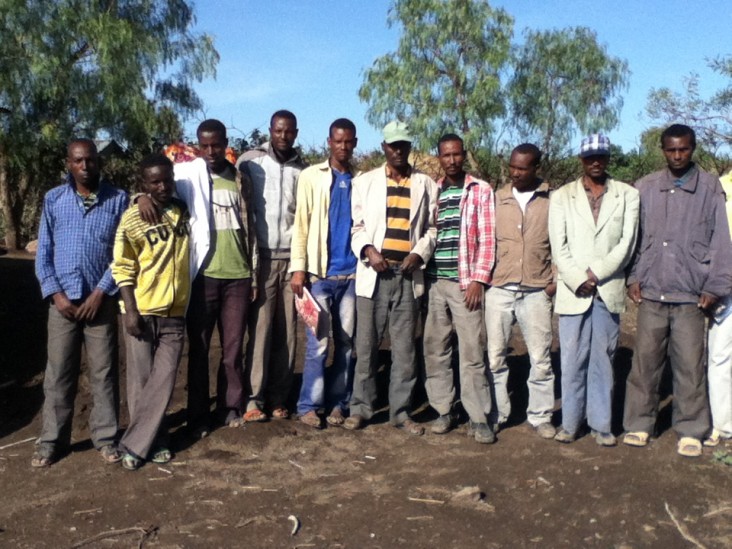
July 2014—Rather than pursue a risky migration abroad, or simply become resigned to a life of extreme poverty, landless youth in a chronically food insecure district in Ethiopia are staying in their families’ villages, while also earning an income. How?
These young men and women in the Dodota district are participating in the Government of Ethiopia’s Productive Safety Net Program, a USAID-supported project to restore their local watershed and rejuvenate degraded land. It is also dramatically changing their lives.
Launched in 2005 with the support of numerous bilateral and multilateral partners, the Productive Safety Net Program targets chronically food insecure families with food and cash transfers. In exchange for the transfers, participants agree to support public works projects, such as rehabilitating local land and water resources. Through their participation in program activities, vulnerable households and communities are better able to withstand future shocks by building up food stocks or savings. Timely and predictable transfers provided under this program help improve household food security and reduce reliance on negative coping mechanisms, such as selling early harvest or depleting livestock.
Catholic Relief Services, a USAID implementing partner, worked in conjunction with the local government in Dodota to organize participants into youth groups to allow them to earn an income. By working together, the youth protect local area closures—land designated for rehabilitation—and earn money by farming the restored land. The youth have also learned to develop bylaws and conduct regular meetings to discuss land issues.
In the Bariyo Keleta area closure, nine different groups comprised of 100 members cooperate to protect the area closure, earning hundreds of dollars in the process by selling the grasses they now farm.
The Marimaro youth group dramatically increased their assets by earning $400 from grass sales in just over a year. This money enabled the previously landless group of 10 youth to rent half a hectare of land to farm white pea beans. The group plans to further diversify their income through oxen and sheep fattening, beekeeping and honey production. By broadening their income base from grasses to other agricultural products, these youth are better positioned to endure future climatic or economic shocks.
“The area closure [provides] a source of income, as we do not have land to farm or any other job,” said one member of the Marimaro group, who vowed to protect the youth group’s gains, “so it will also benefit the next generation.”
The success of the Marimaro youth group echoes throughout Dodota woreda and across Ethiopia. Area closures protected by program participants have resulted in the rehabilitation of more than 290,000 hectares of land over the last two years, allowing beneficiaries to plant crops and provide income for themselves. The program has also resulted in the construction and rehabilitation of more than 70,000 ponds, approximately 12,000 kilometers of new roads, and nearly 2,000 schools.
Designed to address the underlying causes of food insecurity in Ethiopia, the Productive Safety Net Program is improving the country’s sustainable natural resources, increasing beneficiaries’ food security, and strengthening their resilience to shocks. Since 2006, the program has increased the average amount of time that beneficiaries have access to nutritious and affordable foods from about 8.5 months to just over 10 months per year, while also cutting in half the time program recipients go without adequate food.
Links
Follow @USAIDEthiopia, on Flickr, on YouTube







Comment
Make a general inquiry or suggest an improvement.